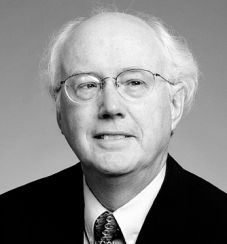He’s already taken some key first steps, overseeing a National Science Foundation-funded project to get researchers to think more broadly into the future, and is in the final stages of a book summarizing his findings and the ideas that have been floated for an alternative Internet architecture.
The idea behind the project, he said, was to get “at least some parts of the research community” to look beyond the incremental and instead “have the courage to ask the more fundamental questions, like, if you didn’t have to worry about migration, what do you think the Internet 15 years from now might look like.”

“It takes a long time to make changes, so someone has to think ahead,” Clark said.
So what might an Internet of the future look like? One goal, obviously, he said, would be to make it safer.
Another change might be addressing. Currently, the way the Internet works is through the shipment of data packets from machine to machine, he says. One alternative is to make it more about connecting to a service rather than a machine.
“There are advantages and disadvantages,” he said. “As a research question, it’s wonderful.”
One of the most extreme ideas from the research community, he said, would be to have smarter routers that would not only remember the packets they have processed, but also require a sender to get permission before passing along large amounts of data.
“The routers in the Internet (today) forward packets, then forget about them,” Clark said. “What if we went down an entirely different path and said every time I send a packet the router is going to remember that and look for a reply. If the only thing I can send you to start a conversation is a very small request, the only way you can send me a large data packet is if I request it. Then you can’t attack me by flooding me with data (a distributed denial of service or DDoS attack.) You would have to have permission to send me data…and a whole class of DDoS attacks would be rendered impossible.”
Clark is working on the project from the Massachusetts Institute of Technology, where he is a senior research scientist in the MIT Computer Science and Artificial Intelligence Laboratory.
Clark began his career there after receiving his PhD in 1973 and has been there ever since.
“It’s a very short resume, he says.
But there is no shortage of achievements.
He joined the Internet project in the mid-1970s, and implemented the Internet protocols for the Multics system, the Xerox PARC ALTO, and the IBM PC. From 1981-1989 he acted as chief protocol architect for the Internet, and chaired the Internet Activities Board.
During the 1990s he worked on mechanisms to support quality of service or QoS, which enable services we use today like voice over Internet protocol (VoIP).
In more recent years, “sort of the decade of the 2000s,” Clark says he got more interested in the issues of economics, regulation and policy, shifting his and his team’s focus much more toward technology policy.
Among the issues Clark says he and his team have been dealing with involve things like measuring if connections between Internet service providers are congested…questions that he says are motivated by policy debates over issues such as whether the Federal Communications Commissions should ban ISPs from charging heavy users higher rates.
So what is the most important issue facing the Internet today?
“It’s a long list,” Clark says. “Security is clearly one getting a tremendous amount of attention right now. The actors are testing the state of security. But it’s not a technical issue. It’s very much sociological, political and so forth. IPv6 (the new standard for Internet protocol) is also very important because we are running out of addresses. There are some issues that are hard to see that we need to pay attention to.
“The Internet works perfectly when it works. But when it doesn’t it’s not clear why. Because routers have no idea what the user is doing when they send their packets.”
